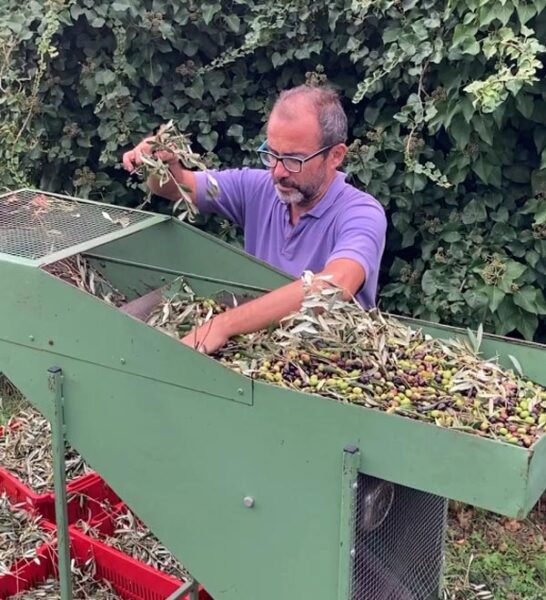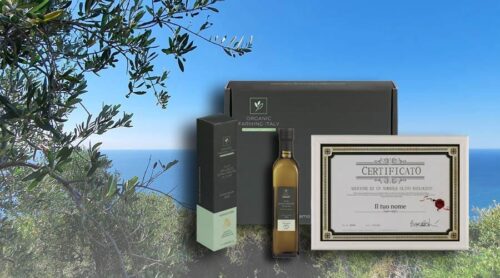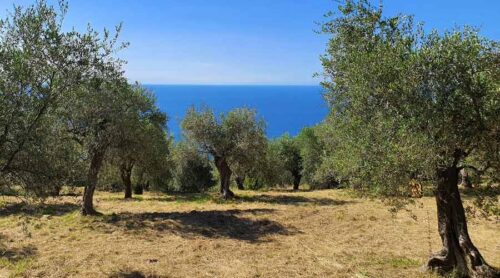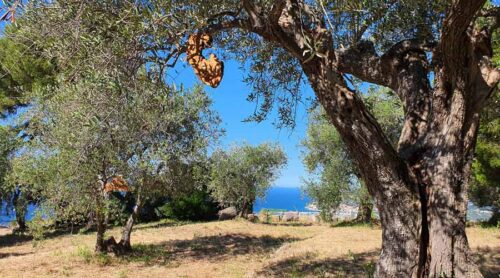Help for organic olive growers in Liguria Italy
At the end of 2023, olive producers in Liguria were faced with a particularly disappointing harvest, which presented them with considerable difficulties. Despite these adversities, they looked back on the above-average yields of 2020 and were confident that the situation would recover the following year. However, the reality of 2022 dashed all hopes: it was another year of disappointment and for 2023 there were many indications of an almost complete crop failure.
It is established agricultural knowledge that olive trees often go through a recovery period after a productive year, which usually leads to an alternation between years of high and low yields. The lower yield in winter was therefore not an immediate cause for concern for olive growers at first.
However, the situation quickly took a turn for the worse. Especially in January and February, the critical time for the blossoming of olive trees, there was a significant lack of rainfall. The lack of water at this critical stage of development caused the trees to reduce their flowering. This had direct impacts on the autumn months, as fewer blossoms inevitably mean a smaller olive harvest.

Organic olive growers therefore started 2022 under difficult conditions. But the real blow came in the summer, when a prolonged period of drought hit the coastal regions and Liguria in particular. The already reduced number of olives suffered greatly from the drought and fell prematurely from the trees – a progressive loss that became noticeable week after week.
Now, shortly before the planned start of the harvest, there are hardly any olives left on the branches. This sobering fact leads to the conclusion that for many farmers the harvest is hardly worthwhile. The yields are so low that the harvest costs exceed the potential income, which leads to the complete failure of the harvest on some farms.
This year’s crop failure represents a total financial loss for producers of organic olives – on the back of an already low yield in the previous year.
What’s more, after this autumn’s failed harvest, the financial outlay for next year is imminent: pruning the trees, fertilizing with organic fertilizer, especially in times of rising prices. The cost of protecting the trees and many other expenses are an additional burden for farmers. They are therefore faced with the challenging situation of having to bear high expenses without any income from the sale of olives.
Some organic olive growers in the region are at a crucial turning point in their careers. Over the past three years, they have been confronted with continuous losses in their income, while at the same time the operating costs of their farms have been steadily increasing. This has brought some of them to the brink of a seemingly hopeless situation, with decisions that could have far-reaching consequences not only for their own future, but also for the ecological diversity and economic stability of the surrounding area.
The withdrawal of an organic olive grower from his business not only means the end of an environmentally friendly farming approach, but also carries the risk of a shift away from organic methods towards conventional farming out of economic necessity. The possible use of artificial pesticides and fertilizers could have serious consequences for soil and water quality and biological diversity.
In addition, financial constraints could lead some farmers to reduce or completely abandon essential sustainable practices such as the use of organic fertilizers, which would negatively affect soil fertility and agricultural productivity in the medium to long term.
Another conceivable step for some could be to give up olive production completely and turn to alternative agricultural methods or even other forms of livelihood altogether, which would result in a profound change in the cultural and economic structure of the region.
Some olive growers have already taken on additional employment, be it in public transportation, education or other sectors, in order to provide financial security for their families. However, this means that they have less time to look after their farms, which in turn could have long-term negative effects. Neglecting the olive groves can lead to further yield losses and thus further drive the cycle of financial bottlenecks and declining agricultural performance.
Foundation of the Aid Fund Organic Olive Farmers Italy “Rete Tesori della Riviera
In the midst of the serious crisis that organic olive growers in Liguria are currently experiencing, a committed group of organic olive growers has launched a remarkable project that not only aims to safeguard organic farming in Liguria, but also to promote it. This initiative is called “Rete Tesori della Riviera” and represents not only a strong sign of solidarity and community, but also a deep desire to bring about positive change in these difficult times.
“Rete Tesori della Riviera ” is a non-profit association that brings together organic farmers and service providers from the organic olive oil production sector along the western Ligurian coast. The overarching goal of this organization is to mitigate the most severe effects of the ongoing drought while ensuring the survival of organic olive farmers.
To achieve these goals, the organization has introduced a number of supporting measures:
- Purchasing groups: These enable the joint purchasing of fertilizers and organic pesticides, which reduces costs and allows resources to be used more efficiently.
- Sharing labor: Farmers support each other in caring for the olive trees to reduce the workload and increase yields.
- Subsidization of materials: The organization provides financial support for the purchase of fertilizers and other necessary materials in order to reduce the financial burden on farmers.
- Aid money in extreme cases: In situations where farms are on the verge of bankruptcy, the organization provides aid money to secure the farmers’ livelihoods.
This program has not only ensured the survival and continued existence of organic farmers in the Imperia region, but also serves as an incentive for conventional farmers to switch to organic farming.
A concrete project for which the aid organization urgently needs donations is the procurement of a wood chipper. Background: The European Union has introduced a subsidy program that stipulates that farmers are no longer allowed to burn tree cuttings, but must shred and compost them. It is therefore necessary to purchase a chopping machine that can be used by any farmer as soon as it is needed. Around 15,000 euros are needed for this project.
The organizer and one of the driving forces behind the organization is Alberto Dalpiaz, who is also the Vice President of the Organic Farmers’ Association in Liguria and the Slow Food Association. For him and his family, there is no alternative to sustainable farming on the Organic Farm San Martino. Their farm is based on a deep respect for the natural beauty and value of the land in which it is located. From the very beginning, even before organic certification existed, they implemented the idea of an organic existence on their San Martino farm.
To support this impressive endeavor, a donation account for the aid fund “Organic Olive Farmers Italy” is currently being set up. Anyone who would like to contribute to helping the organic olive growers in these difficult times can offer their support.
Contact information for support and donations:
Rete Tesori della Riviera
Piazza Dante Alighieri 11
18100 Imperia/IM
Tel.: +39 335 8478123
VAT no. 01626070088
Alberto Dalpiaz and the entire “Rete Tesori della Riviera” community put their heart and soul into preserving the tradition and quality of olive oil production in Liguria. Their tireless commitment deserves our recognition and support.
How you can help organic farmers in Italy
Support via an organic olive tree sponsorship: To the olive tree sponsorship >>
Bank details for donations:
Owner: Rete Tesori della Riviera
Bank: BANCO BPM
IBAN: IT 79 U 05034 10500 000000022711
BIC: BAPPIT21F20



